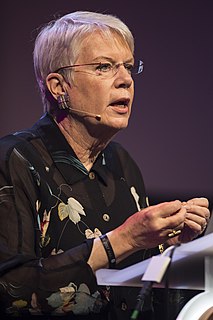A Quote by Neil deGrasse Tyson
We only recently figured out the origin of our own moon. And we have some idea of how the Sun and Earth formed, but that's only because modern telescopes empower us to see other stars and planets freshly hatched within gas clouds across the galaxy. As for the origin of life itself, the transition from inanimate molecules to what any of us would call life remains one of the great frontiers of biology.
Quote Topics
Across
Any
Because
Biology
Call
Clouds
Earth
Empower
Figured
Formed
Frontiers
Galaxy
Gas
Great
Hatched
How
Idea
Inanimate
Itself
Life
Modern
Molecules
Moon
Only
Origin
Origin Of Life
Other
Our
Out
Own
Planets
Recently
Remains
See
Some
Stars
Stars And Planets
Sun
Telescopes
Transition
Us
Within
Would
Related Quotes
A wonderful area for speculative academic work is the unknowable. These days religious subjects are in disfavor, but there are still plenty of good topics. The nature of consciousness, the workings of the brain, the origin of aggression, the origin of language, the origin of life on earth, SETI and life on other worlds...this is all great stuff. Wonderful stuff. You can argue it interminably. But it can't be contradicted, because nobody knows the answer to any of these topics.
Recognize that the very molecules that make up your body...are traceable to the crucibles that were once the centers of high mass stars that exploded their chemically rich guts into the galaxy, enriching pristine gas clouds with the chemistry of life. So that we are all connected to each other biologically, to the earth chemically and to the rest of the universe atomically.
we look up and we hope the stars look down, we pray that there may be stars for us to follow, stars moving across the heavens and leading us to our destiny, but it's only our vanity. We look at the galaxy and fall in love, but the universe cares less about us than we do about it, and the stars stay in their courses however much we may wish upon them to do otherwise. It's true that if you watch the sky-wheel turn for a while you'll see a meteor fall, flame and die. That's not a star worth following; it's just an unlucky rock. Our fates are here on earth. There are no guiding stars.
Give us detailed, testable, mechanistic accounts for the origin of life, the origin of the genetic code, the origin of ubiquitous bio macromolecules and assemblages like the ribosome, and the origin of molecular machines like the bacterial flagellum, and intelligent design will die a quick and painless death.
When I grew up as a kid, we didn't know there were any other planets outside of our own solar system. It was widely speculated that planet formation was an incredibly rare event and that it's possible that other planets just don't exist in our galaxy, and it's just this special situation where we happen to have planets around our sun.
There's no doubt that the search for planets is motivated by the search for life. Humans are interested in whether or not life evolves on other planets. We'd especially like to find communicating, technological life, and we look around our own solar system, and we see that of all the planets, there's only one that's inhabited.
And when we give each other Christmas gifts in His name, let us remember that He has given us the sun and the moon and the stars, and the earth with its forests and mountains and oceans--and all that lives and move upon them. He has given us all green things and everything that blossoms and bears fruit and all that we quarrel about and all that we have misused--and to save us from our foolishness, from all our sins, He came down to earth and gave us Himself.
How easily we make things as way, truth, and life. Or, we call hot atmosphere as life, we label clear thought as life. We consider strong emotion or outward conduct as life. In reality, though, these are not life. We ought to realize that only the Lord is life. Christ is our life. And it is the Lord who lives out this life in us. Let us ask Him to deliver us from the many external and fragmentary affairs that we may touch only Him. May we see the Lord in all things-way, truth, and life are all found in knowing Him. May we really meet the Son of God and let Him live in us. Amen.
































